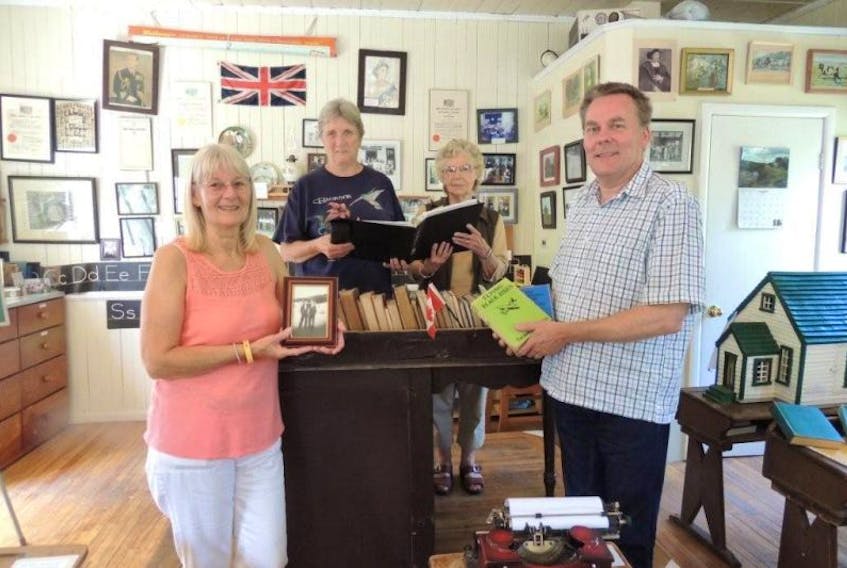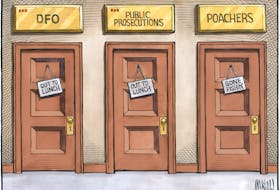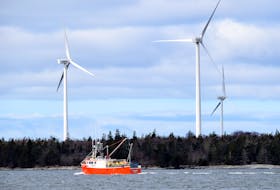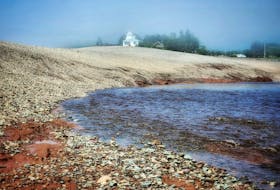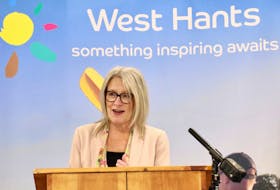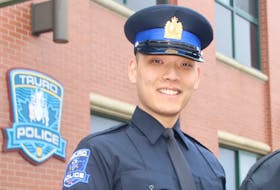She and her husband Mark, of Peterborough, England, were retracing the journey her father began as a 12-year-old wartime evacuee from a working class town in Yorkshire, a journey highlighted by stays in Mount Uniacke and Barneys River.
Nova Bannerman, the driving force behind the Barneys River Schoolhouse Museum, was waiting for them.
“My father is so much on my mind. I’m happy, sad and overwhelmed,” said Lynne, looking around the school where her father was both student and janitor and where he smoked his first cigarette.
A few years before his death in 2012, Ronald Mizon emailed the museum, inquiring about “Wonderful Barneys River” and his old friend, Donald Bannerman. Donald had passed away but Nova, his wife, began corresponding with Mizon and more recently was contacted by Lynne after she and her husband decided to come to Nova Scotia.
Lynne grew up without knowing much about her father’s time in Canada. That changed later in his life when her mother became unwell.
“Each week he’d take my mother to the hairdresser and to pass the time while he waited he began to write little vignettes about his early life and then about his time in Canada.”
One of his stories won him a laptop.
“That really brought his past back to him, being able to look up places he had stayed in Nova Scotia and being able to make contacts,” Mark pointed out.
One of the other contacts he made was with Rosanne Bland who compiles the monthly Uniacke Newsletter.
“I was happy to publish his memories of our community but it went further for me because my father had been a wartime evacuee in the Second World War and he never returned to Britain.”
She followed Lynne and Mark to Barneys River to learn more of Ronald’s story and while the pieces do not all align perfectly and unanswered questions remain, Lynne is grateful for what she has found.
“Towards the end my father would dictate his stories and I would type them up. I learned so much I had never known. It was very emotional for both of us.”
She marvels at what the journey to Canada must have been like for child evacuees.
“My father had great experiences but still, he was just a child when he came.”
Mark points out the differences between English town and cities and rural Nova Scotia are still striking.
“Lynne and I weren’t prepared for the vast expanses of land and being so close to the sea wherever you go. Being just a boy, he must have found it very different. “
He and his sister travelled in a convoy of ships, one of which was torpedoed by Germans with only 13 of the 90 children on board rescued.
As they sat on wooden benches and in schoolhouse desks, Lynne, Bannerman and Bland traded bits of information gleaned from stories, letters and articles.
“I never knew him but I saw him at church in Sutherlands River. I was a Canadian girl and he was an English boy so I certainly noticed him,” Bannerman said, adding the two were once in a group of children who rode together in the back of a pickup truck.
No one is sure why the Mizons were moved several times and split up for a period. They were in Canada under a government program and went where they were sent.
“I know he stayed with a Powell family in Egerton and then with Linus and Katherine Cameron in Barneys River. With no one his age at the Camerons’ place, so he was often at the Bannermans. He told me he had many meals there,” said Bannerman, adding his photo was in a family album and her husband remembered him fondly.
Mizon took to farming and learned to drive a team of horses, carrying slabs from the nearby lumber mill to the school where he arrived early to build up the fire in winter. He also learned to drive a car, albeit on the wrong side of the road by British standards.
When Lynne remembered a snippet of a story about a store and a storekeeper’s daughter her father may have fancied, Bannerman was able to identify both the store and the daughter and confirm the relationship.
Bannerman’s daughter Colene Williams was touched when Bland pointed to a newspaper article in which Mizon wrote of going to say goodbye to the Bannermans and his “dear friend, Donald.”
“We always knew of him and we had a chemistry set that belonged to him so as my father’s friend, he was very real to us. Meeting his family here in the schoolhouse is amazing.”
When Mizon turned 16 he left school to work at Eastern Woodworkers in New Glasgow. He wrote that he had a good job and a landlady who fed him well.
When the war ended he was obliged to return to England, but Lynne believes he may have preferred to stay. He joined the British navy and made one attempt to get back to Canada.
“With the help of a Canadian, he stowed away on a vessel headed for Canada but he was caught and got into a good deal of trouble.”
He eventually met his wife Sheila and settled in Peterborough.
“My mother had family all around her and would not have left the country. I don’t know why he didn’t talk about the Canadian years for so long but his sister does not talk of them, either.’’
When asked why she thought Mizon and his friend Donald had never written to each other, Lynne could only shrug.
“I’d say it was just because they were boys,” offered Bannerman.
Today Lynne and Mark have plans to meet Janet Hingley, one of Mizon’s classmates during his student days in Barneys River.

